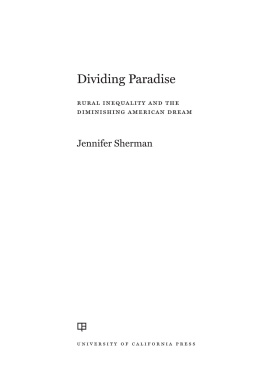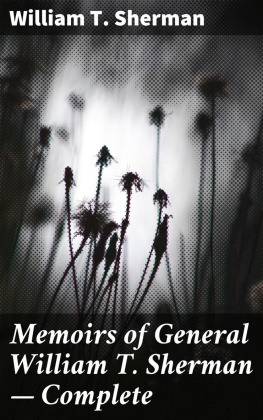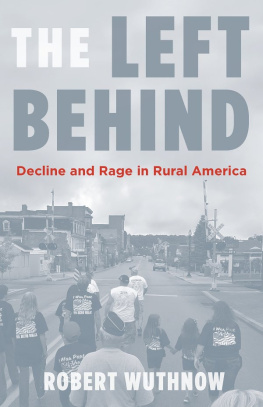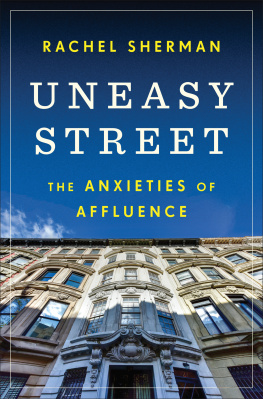Those Who Work, Those Who Dont
Those Who Work, Those Who Dont
Poverty, Morality, and Family in Rural America
Jennifer Sherman

was previously published as Coping with Rural Poverty: Economic Survival and Moral Capital in Rural America, Social Forces 85, no. 2 (December 2006): 891913. Copyright 2006 by the University of North Carolina Press. Reprinted by permission of the publisher.
Copyright 2009 by the Regents of the University of Minnesota
All rights reserved. No part of this publication may be reproduced, stored in a retrieval system, or transmitted, in any form or by any means, electronic, mechanical, photocopying, recording, or otherwise, without the prior written permission of the publisher.
Published by the University of Minnesota Press
111 Third Avenue South, Suite 290
Minneapolis, MN 55401-2520
http://www.upress.umn.edu
Library of Congress Cataloging-in-Publication Data
Sherman, Jennifer.
Those who work, those who dont : poverty, morality, and family in rural
America / Jennifer Sherman.
p. cm.
Includes bibliographical references and index.
ISBN 978-0-8166-5904-3 (hc : alk. paper) ISBN 978-0-8166-5905-0
(pb : alk. paper)
1. Rural poorUnited States. 2. United StatesRural conditions.
I. Title.
HC110.P6S473 2009
362.50973'091734dc22 2009018656
Printed in the United States of America on acid-free paper
The University of Minnesota is an equal-opportunity educator and employer.
20 19 18 17 16 15 14 13 12 11 10 09 10 9 8 7 6 5 4 3 2 1
Contents
Preface Preserving Anonymity
Those Who Work, Those Who Dont tells the story of the people and community of Golden Valley, California. Golden Valley is not its real name, and all of the names mentioned in this book are pseudonyms, including the names of all people, places, and businesses. With qualitative and ethnographic research, it is not uncommon to use pseudonyms to protect the anonymity of subjects. Because they are often sharing personal or controversial information, it is necessary to offer subjects some protection from either embarrassment or the negative reactions of those who might disagree with their perspectives. Respecting and maintaining the subjects privacy is vital to the completion of a project of this nature. In the case of Golden Valley, I have taken this practice as far as I can. The stories presented here are personal ones, and for many people they were difficult tales to tell. All interview subjects signed consent forms that acknowledged their willingness to participate in interviews and be quoted from them. The forms explained that recordings and transcripts of their interviews would be identified by numbers rather than names and would be kept locked and available only to me. Consent forms also pledged that subjects would remain anonymous and that all identifying details would be changed in any writing about this research to ensure their anonymity. Thus, not only are names changed, but in several cases small details have also been altered to make it more difficult for Golden Valley residents to recognize one another in the pages of this book. These details were generally minor, such as peoples specific injuries, places of work (also pseudonyms), or the number of children in their families. I hope that such small deviations from their truths will help to keep their identities concealed.
To further protect the privacy of Golden Valley residents, the sources of information have been omitted in some sections of the book. Much of the background information about the community presented here comes from local sources or those that mention the community or county by name. This includes newspaper articles, county statistical reports, and information from the Web sites of local organizations. When such sources are used, no citation is given so as to ensure that Golden Valley remain anonymous even to those whose curiosity might compel them to take the extra step of tracking down an original source and through it discover the communitys identity. Particularly, much of the information in bears no citation. I hope that the reader will trust in the accuracy of the data and understand that keeping my promise to the people of Golden Valley to prioritize their privacy must take precedence over full disclosure of all data sources.
Acknowledgments
Many people thought I was crazy to move to such a remote, isolated place as Golden Valley. I often agreed with them through the long, dark days of winter, the rainstorms that flooded the creek banks, the snowstorms that stranded me miles from town, and the frequent blackouts that deprived me of both electricity and running water. But those who visited in the spring and summer were able to see the other side: the amazing views of mountains and the evening alpine glow, the wildlife of all kinds, the apples in the orchard and the asparagus in the garden. Golden Valley was a place of extremes, with a climate that varied from hot, sunny, parched summers to oppressive, damp, cold winters that caused widespread seasonal depression for many of its residents, including me. It was not an easy place to live in, nor was it an easy place to conduct research in. I have many people to thank for my survival there and the completion of this project.
First, I express my deepest gratitude to the people of Golden Valley. They exhibited incredible strength and beauty in the face of overwhelming struggle and hardship and were amazingly generous with both their time and their limited resources. I could not have managed there without their selfless gifts, from fixing broken cars to helping stack wood, to lending their pets, to keeping me company at strange hours and simply befriending this lonely outsider. I cannot thank them enough for all the kindnesses they showed me, in particular their willingness to open their homes and share their stories with me. More than anything, they wanted the assets of their community to be recognized alongside its harshness. I hope I managed to portray it at least somewhat accurately, although I know I can never fully do it justice.
I thank individually Raelyn, Amy, Ben, Bianca, Pat, Rachel, Dave, Annette, and Wes for their combination of friendship, help, and support. Your kindness and companionship meant so much to me. A year in Golden Valley would have been much more difficult, if not impossible, without you.
This project would never have begun without the support of my incredible mentors and friends back at the University of CaliforniaBerkeley. Raka Ray deserves much of the credit for all I have accomplished. From my first days at Berkeley she supported and believed in me, providing invaluable advice and wisdom as well as incisive critiques of my work. Neither of us can count the number of times I have cried in front of her or the number of times her strength and the sheer force of her will compelled me to believe in myself and keep persevering. While her urban soul was appalled by the idea of moving to a place like Golden Valley, she never wavered in her confidence in this work and in her ability to see its sociological merit regardless of its exotic setting. Because of her I have learned to be a sociologist first and to apply sociological inquiry and analysis to any setting or subject matter. This gift is priceless, as is her encouragement, criticism, and friendship. She demanded from my work higher standards than I would have imagined possible, and I am still surprised at what is achievable with the right mentorship. I am blessed to know you and to have worked with you. Thanks for putting up with me for all these years.
Next page








